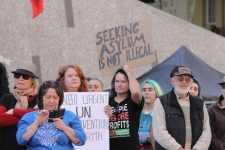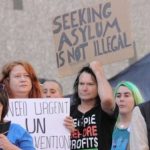Australian Government is Causing Humanitarian Crisis

The Turnbull government recently began cutting off financial support to a new cohort of people seeking asylum, leading refugee advocacy groups to warn that this cruel policy has the potential to cause a humanitarian crisis on Australian streets.
On 27 June, the Department of Home Affairs began distributing letters advising asylum seekers that their Status Resolution Support Services (SRSS) will be cut off in a matter of weeks. The SRSS consists of a basic living allowance of $35 a day, along with counselling services.
In February, home affairs minister Peter Dutton approved the policy, which, in his thinking, is supposed to get asylum seekers with the ability to work into employment. But, as critics have pointed out, pushing people into destitution is no way to support them in entering the workforce.
This strategy also continues a recent trend in minister Dutton’s decision-making process of approving policies that can potentially lead to already vulnerable asylum seekers living in the community having to sleep on the streets.
Up to 7,000 SRSS recipients could be affected by this policy. Single people who’ve already been deemed “work ready” will have their supports taken away by the end of July, while families with young children will begin to have their income removed in August.
So, thousands of people could have no income by the end of the year.
Deprived of necessities
“We anticipate a significant spike in homelessness, hunger and poverty amongst people seeking asylum,” said Simon Bruck, senior solicitor at the Refugee Advice and Casework Service (RACS). “We’ve already had people call in panic about SRSS cuts.”
According to Mr Bruck, around 1,500 people seeking asylum will be affected by the first wave. And along with their income, any torture and trauma counselling and assistance with their casework that they’ve been receiving will also be withdrawn.
Service providers were instructed to begin reviewing SRSS recipients for job-readiness in April. Mr Bruck pointed out that there is no tribunal review process to evaluate whether the decisions that have been made were appropriate.
“RACS is worried they are going to cut people off from critical support in an attempt to save money,” Mr Bruck told Sydney Criminal Lawyers®. And in the meantime, this will “create a totally unnecessary humanitarian crisis and realistically not save that much money.”
A crisis in the making
The asylum seekers who’ve been told their SRSS will soon be coming to an end are already living under uncertain circumstances. And now they face having no money to pay the rent or buy basic necessities if they can’t find employment in a limited amount of time.
The NSW Alliance for People Seeking Asylum (NAPSA) has called on the government to reverse its decision. The alliance was founded by the Jesuit Refugee Service Australia, the Asylum Seekers Centre, House of Welcome, as well as RACS.
NAPSA warned that NGOs and charities that provide services for people seeking asylum are already overstretched, and the minister’s decision will lead to a rise in labour exploitation, chronic hunger, destitution and homelessness.
“This is a deliberate action designed to cause great harm,” Asylum Seekers Centre chief executive Frances Rush said in a statement. “Currently no agency, individually or collectively, has the capacity to deal with the sheer number of people who will turn to the community for basic necessities.”
Pushing more onto the street
However, this is not the only mean-spirited policy that Mr Dutton has initiated over the last year. In late August, the then immigration minister announced that an initial 70 asylum seekers were facing having their welfare payments cancelled and government-supported accommodation withdrawn.
This ongoing policy targets around 370 asylum seekers known as the Let Them Stay cohort. These are former Manus Island and Nauru detainees, who were brought to Australia to undergo medical treatment. The group includes 116 children, 50 of whom were born in this country.
These people are being placed onto “final departure bridging visa E.” These visa last for six months and include the right to work.
Once on the visa, individuals have their financial support cut off immediately and they are given three weeks to vacate their accommodation, while families are given six weeks before their income is removed, along with their shelter.
In May, the Home Affairs Department told 100 individuals, including 60 people from families with children under 18, that they were being placed on the new visa. Under current laws, these asylum seekers are ineligible to apply for protection as they arrived in Australia by boat.
Another asylum seeking hurdle
Mr Bruck also drew attention to another consequence of the SRSS cuts that involves the actual asylum seeking process. As the immigration status of these people is currently unresolved, they need to submit visa applications and undergo interviews in order to continue with the process.
“Our experience shows that when people are left homeless, they will probably find it much harder to engage in the process and maintain their documents,” Mr Bruck stressed. “We worry their protection visa applications will suffer as a result.”
So, this means that Dutton’s new policy of throwing the current living circumstances of thousands of individuals into disarray also has the effect of making it much harder for them to continue on with the process of seeking protection in this country.
Pro bono legal support
RACS assisted close to 2,000 people seeking asylum with the lodgement of their protection visa applications last year. And now it’s undertaking the mammoth task of representing them during their daunting temporary protection visa interviews.
“It is a stressful and complex interview process for people seeking asylum,” Mr Bruck explained. “We have experienced some inconsistent decision making which has caused real problems for some people who under a different officer would have been protected.”
The lawyer said it’s expected there will be a steady flow of interviews for the next 12 to 18 months. He also expressed concerns about “the unfair and restrictive nature of the review process,” which involves asylum seekers having to provide a five page submission written in English.
“To do that without legal support is near impossible, so we continue to fundraise in order to support more people who need this crucial legal help,” he concluded.
RACS is currently seeking donations to maintain its vital work.








